 W
WJohn Alsop Jr. was an American merchant and politician from New York City. He signed the Articles of Confederation. He was a delegate for New York to the Continental Congress from 1774 to 1776.
 W
WEgbert Benson was a lawyer, jurist, politician, and one of the Founding Fathers of the United States who represented New York State in the Continental Congress, Annapolis Convention, and the United States House of Representatives. He served as a member of the New York constitutional convention in 1788 which ratified the United States Constitution. He also served as the first attorney general of New York, chief justice of the New York Supreme Court, and as the chief United States circuit judge of the United States circuit court for the second circuit.
 W
WGeorge Clinton was an American soldier and statesman, considered one of the Founding Fathers of the United States. A prominent Democratic-Republican, Clinton served as the fourth vice president of the United States from 1805 until his death in 1812. He also served as governor of New York from 1777 to 1795 and from 1801 to 1804. Along with John C. Calhoun, he is one of two vice presidents to hold office under two presidents.
 W
WCharles DeWitt was an American statesman and miller from the U.S. state of New York. He served as a delegate to the Continental Congress.
 W
WJames Duane was an American attorney, jurist, and American Revolutionary leader from New York. He served as a delegate to the First Continental Congress, Second Continental Congress and the Congress of the Confederation, a New York state senator, the 44th Mayor of New York City, the 1st post-colonial Mayor of New York City and a United States District Judge of the United States District Court for the District of New York. Duane was a signatory of the Continental Association and the Articles of Confederation and is considered one of the Founding Fathers of the United States.
 W
WWilliam Duer was a British-born American lawyer, developer, and speculator from New York City. A Federalist, Duer wrote in support of ratifying the United States Constitution as "Philo-Publius". He had earlier served in the Continental Congress and the convention that framed the New York Constitution. In 1778, he signed the United States Articles of Confederation and is one of the Founding Fathers of the United States.
 W
WWilliam Floyd was an American politician from New York, delegate to the Continental Congress, and a signer of the Continental Association and the United States Declaration of Independence. He is one of the Founding Fathers of the United States.
 W
WLeendert "Leonard" Gansevoort was an American political leader from New York who served as a delegate to the Continental Congress in 1788.
 W
WDavid Gelston was an American merchant and politician.
 W
WAlexander Hamilton was a Caribbean-born American statesman, politician, legal scholar, military commander, lawyer, banker, and economist. He was one of the Founding Fathers of the United States. He was an influential interpreter and promoter of the U.S. Constitution, as well as the founder of the nation's financial system, the Federalist Party, the United States Coast Guard, and the New York Post newspaper. As the first secretary of the treasury, Hamilton was the main author of the economic policies of President George Washington's administration. He took the lead in the federal government's funding of the states' debts, as well as establishing the nation's first two de facto central banks, a system of tariffs, and friendly trade relations with Britain. His vision included a strong central government led by a vigorous executive branch, a strong commercial economy, support for manufacturing, and a strong military.
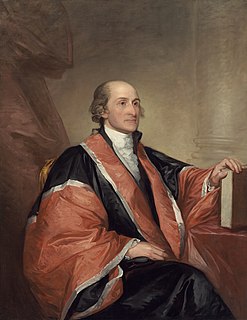 W
WJohn Jay was an American statesman, patriot, diplomat, Founding Father, abolitionist, negotiator, and signatory of the Treaty of Paris of 1783. He served as the second governor of New York and the first chief justice of the United States (1789–1795). He directed U.S. foreign policy for much of the 1780s and was an important leader of the Federalist Party after the ratification of the United States Constitution in 1788.
 W
WJohn Ten Eyck Lansing Jr. was an American lawyer and politician.
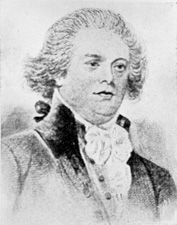 W
WJohn Laurance was a delegate to the 6th, 7th and 8th Congresses of the Confederation, a United States Representative and United States Senator from New York and a United States District Judge of the United States District Court for the District of New York.
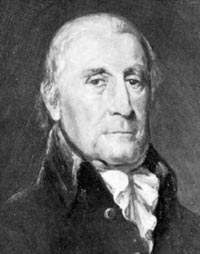 W
WFrancis Lewis was a Welsh merchant and signer of the United States Declaration of Independence as a representative of New York.
 W
WEzra L'Hommedieu was an American lawyer and statesman from Southold, New York in Suffolk County, Long Island. He was a delegate for New York to the Continental Congress and again in 1788. His national offices overlapped with those he served in the state: in the State Assembly (1777-1783) and in the state senate (1784-1792) and (1794-1809); he was a member of the state constitutional convention in 1801. He also served in local offices, as clerk of Suffolk County from January 1784 to March 1810 and from March 1811 until his death that year. He was a regent of the University of the State of New York.
 W
WPhilip Livingston was an American merchant and statesman from New York City. He represented New York at the October 1774 First Continental Congress, where he favored imposing economic sanctions upon Great Britain as a way of pressuring the British Parliament to repeal the Intolerable Acts. He was also a delegate to the Second Continental Congress from 1775 to 1778, and signed the Declaration of Independence.
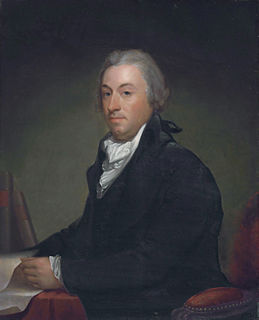 W
WRobert Robert Livingston was an American lawyer, politician, diplomat from New York, and a Founding Father of the United States. He was known as "The Chancellor", after the high New York state legal office he held for 25 years. He was a member of the Committee of Five that drafted the Declaration of Independence, along with Thomas Jefferson, Benjamin Franklin, John Adams, and Roger Sherman. Livingston administered the oath of office to George Washington when he assumed the Presidency in 1789. He was elected a member to the American Philosophical Society in 1801.
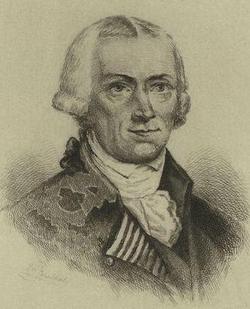 W
WWalter Livingston was an American merchant, lawyer and politician.
 W
WIsaac Low was an American merchant in New York City who served as a member of the Continental Congress and as a delegate to the New York Provincial Congress. Though originally a Patriot, he later joined the Loyalist cause in the American Revolution.
 W
WAlexander McDougall was a Scottish-born American seaman, merchant, a Sons of Liberty leader from New York City before and during the American Revolution, and a military leader during the Revolutionary War. He served as a major general in the Continental Army, and as a delegate to the Continental Congress. After the war, he was the president of the first bank in the state of New York and served a term in the New York State Senate.
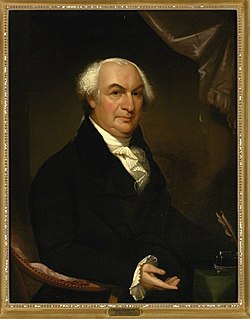 W
WGouverneur Morris was an American statesman, a Founding Father of the United States, and a signatory to the Articles of Confederation and the United States Constitution. He wrote the Preamble to the United States Constitution and has been called the "Penman of the Constitution." In an era when most Americans thought of themselves as citizens of their respective states, Morris advanced the idea of being a citizen of a single union of states. He was also one of the most outspoken opponents of slavery among all of those who were present at the Constitutional Convention. He represented New York in the United States Senate from 1800 to 1803.
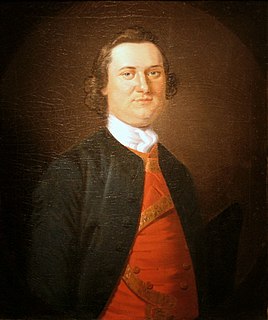 W
WLewis Morris was an American landowner and developer from Morrisania, New York, presently part of Bronx County. He signed the U.S. Declaration of Independence as a delegate to the Continental Congress from New York.
 W
WPhilip John Schuyler was an American general in the Revolutionary War and a United States Senator from New York. He is usually known as Philip Schuyler, while his son is usually known as Philip J. Schuyler.
 W
WJohn Morin Scott was a lawyer, military officer, and statesman before, during and after the American Revolution.
 W
WHenry Wisner was an American miller from Goshen, New York. He was a patriot leader during the American Revolution who voted for Independence on July 4, 1776 at the creation of the Declaration of Independence, and represented New York in the Continental Congress.
 W
WAbraham Yates Jr. was an American lawyer, civil servant, and pamphleteer from Albany, New York.